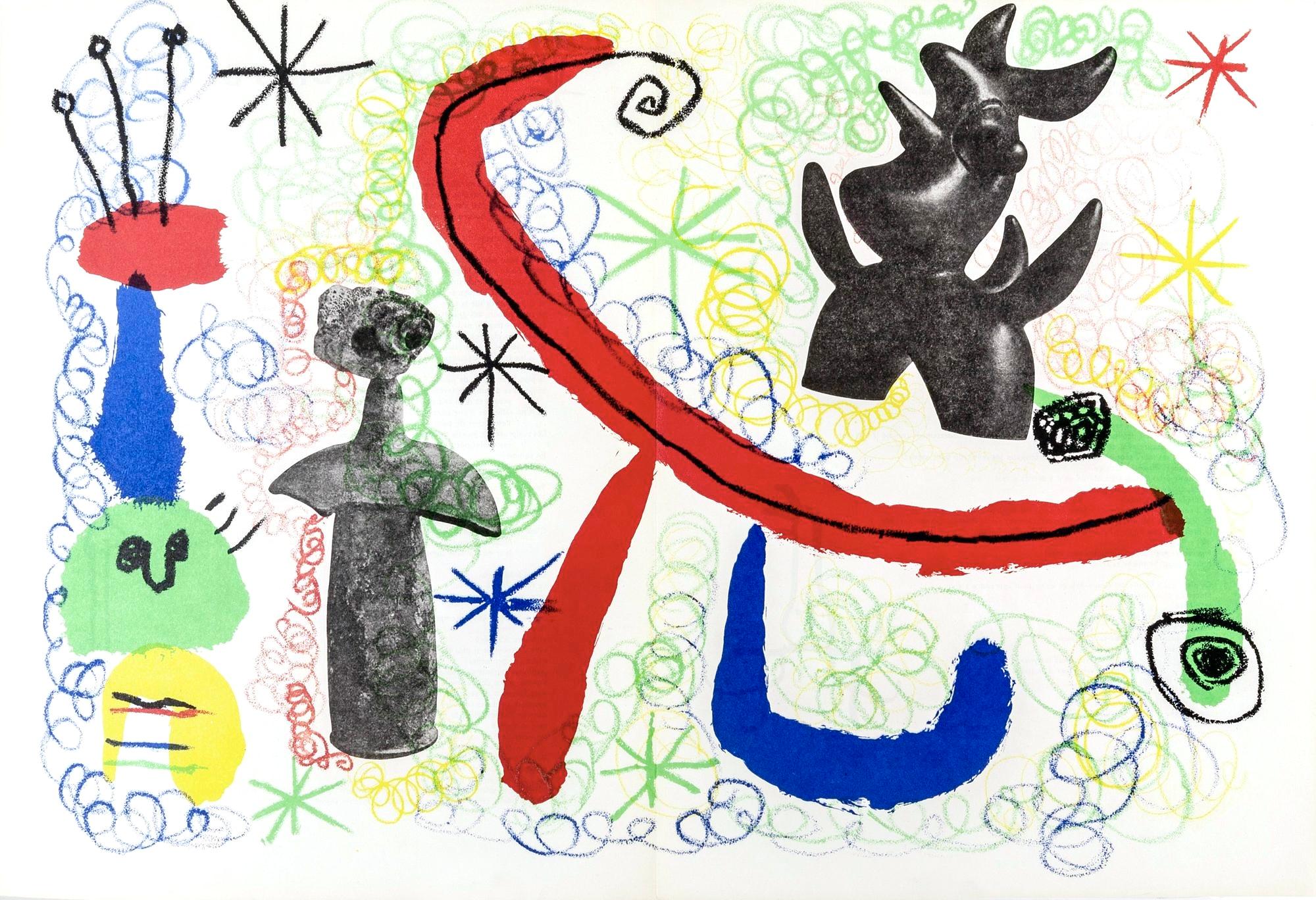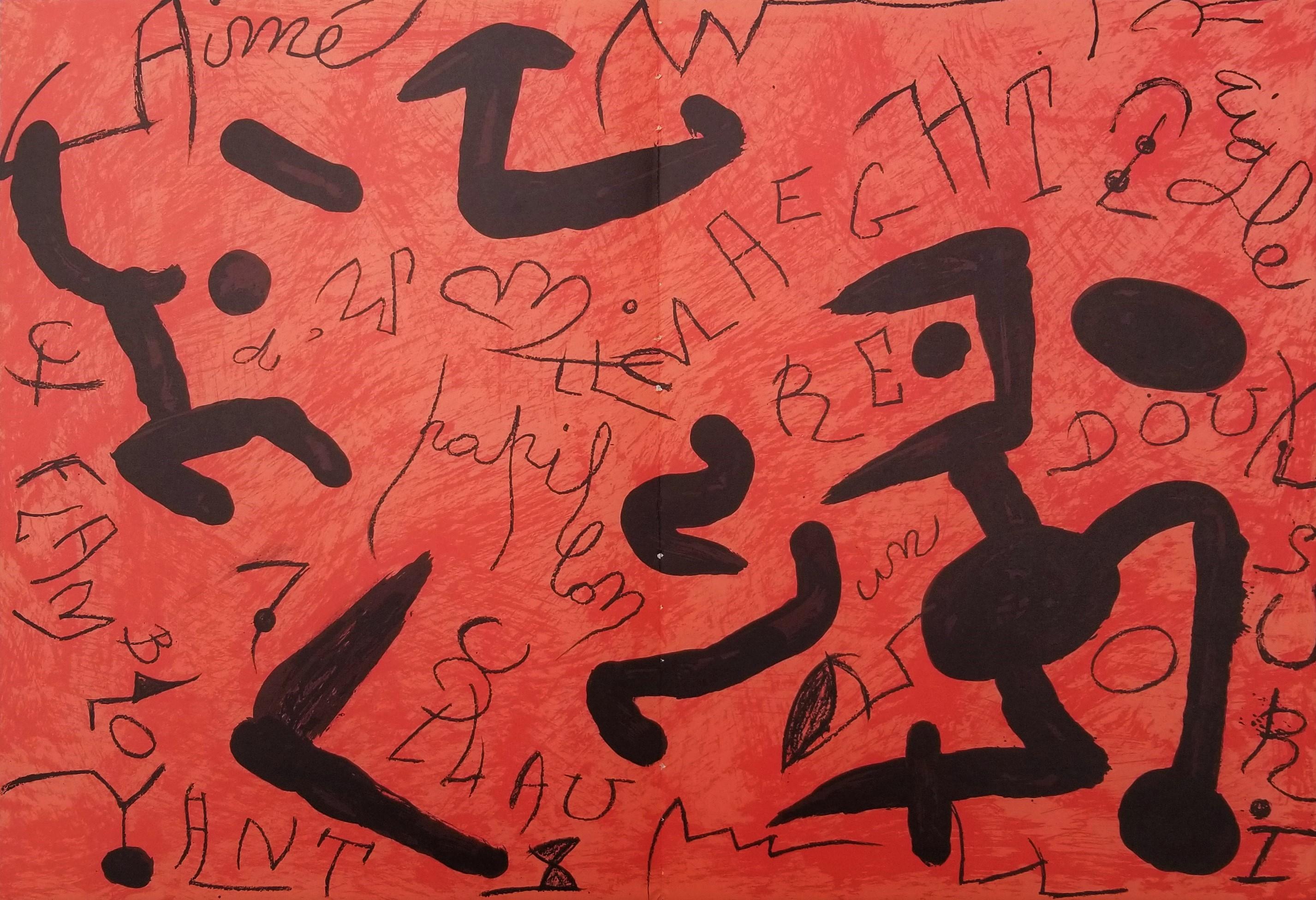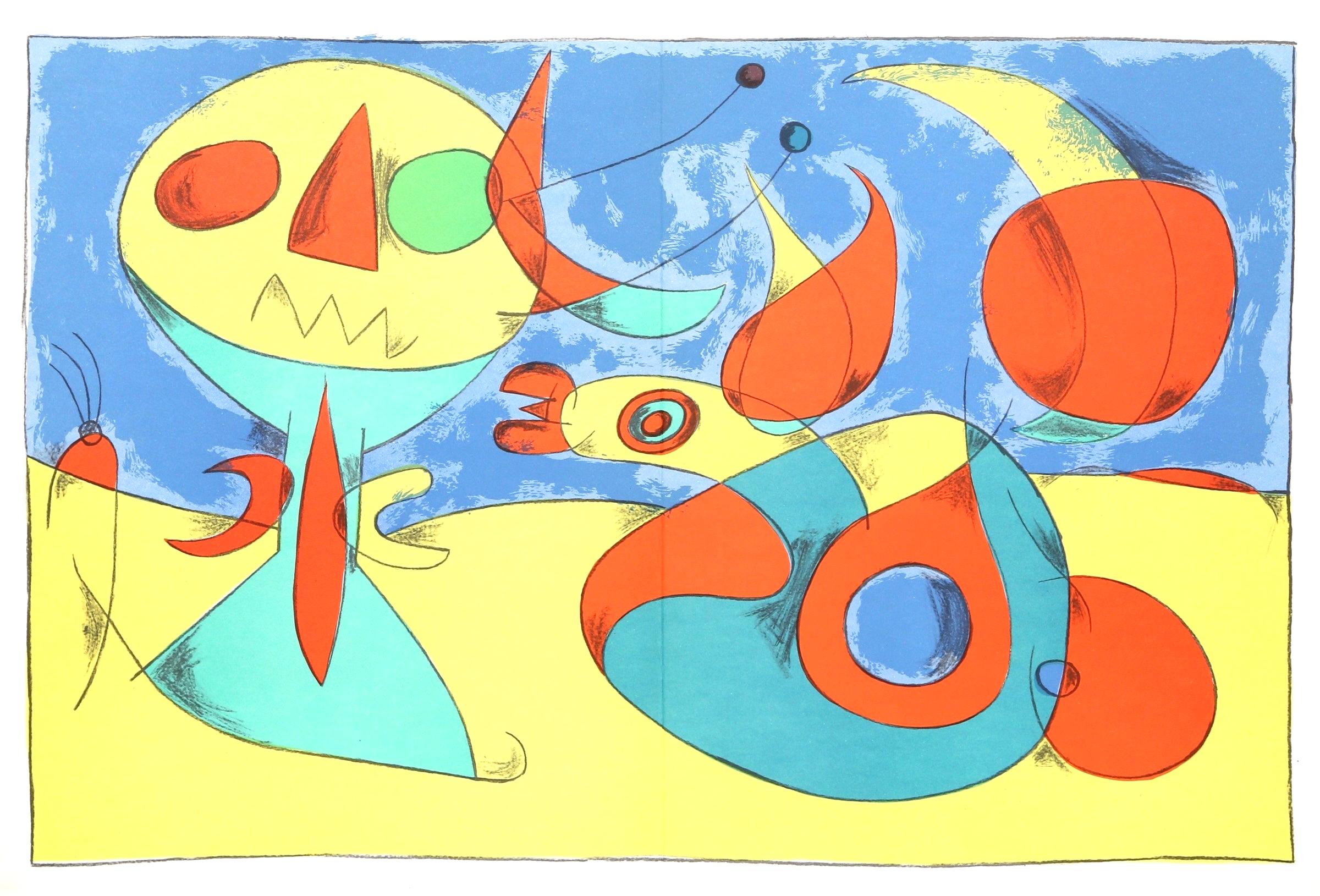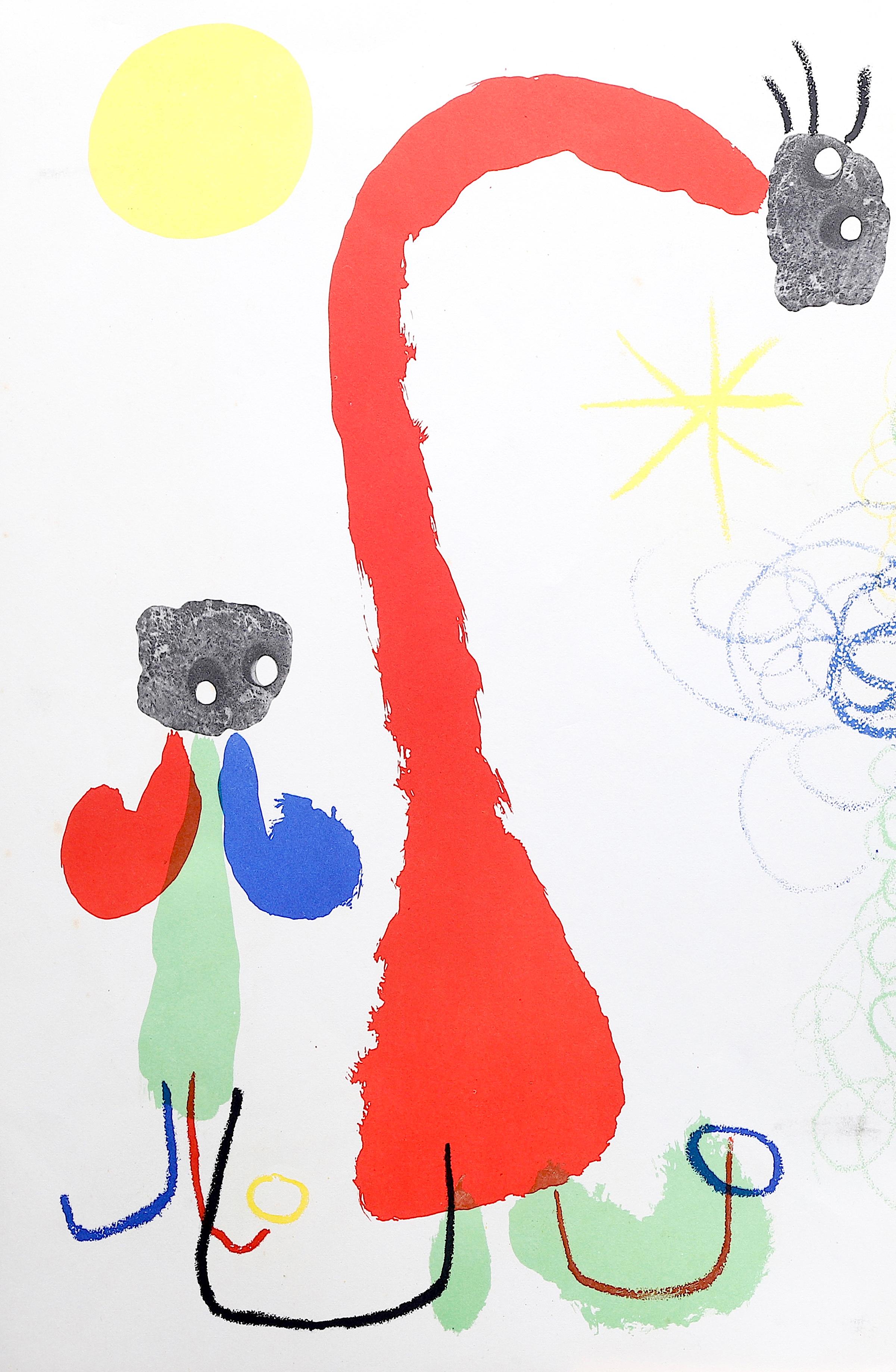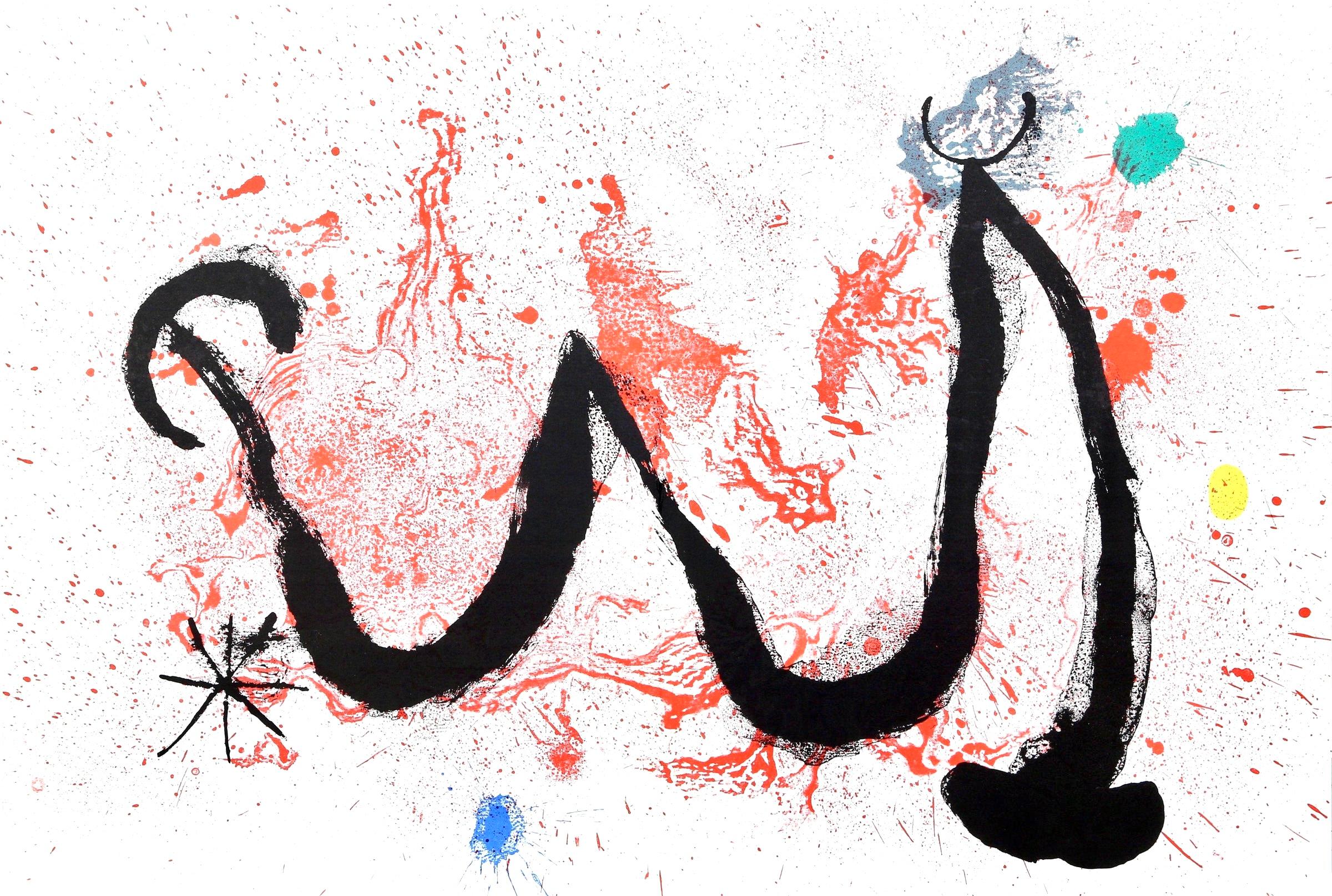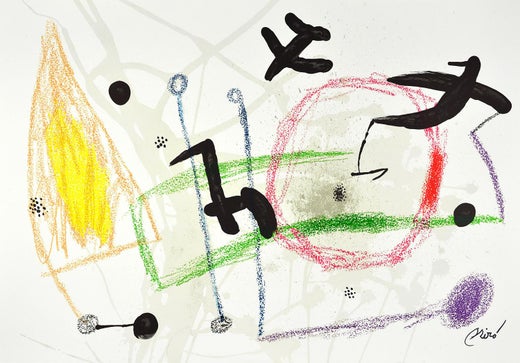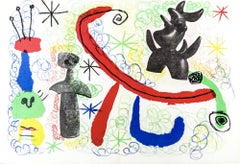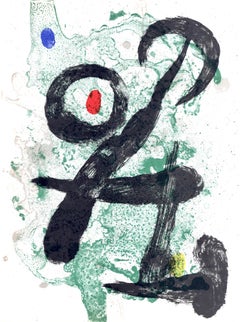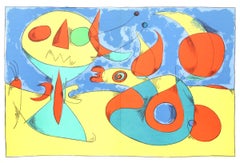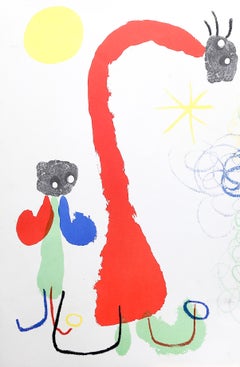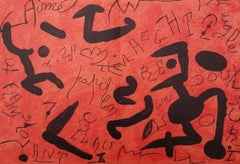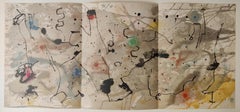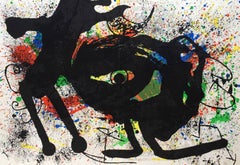This exquisite lithograph by Joan Miro (1893–1983), titled Hommage a Aime Maeght (Tribute to Aime Maeght), originates from the historic 1982 folio Derriere le Miroir, No. 250, Hommage a Aime et Marguerite Maeght (Tribute to Aime and Marguerite Maeght). Published by Maeght Editeur, Paris, under the direction of Aime Maeght, and printed by Imprimerie Moderne du Lion, Paris, this composition embodies Miro’s lyrical approach to abstraction, uniting bold color, organic form, and poetic symbolism. In Hommage a Aime Maeght (Tribute to Aime Maeght), Miro pays visual tribute to his longtime friend and patron through a composition that vibrates with cosmic energy and painterly rhythm, reflecting the joy and freedom that defined his art.
Executed on velin paper, this lithograph measures 15 x 22 inches (38.1 x 55.9 cm), with centerfold, as issued. As issued, it is unsigned and unnumbered, consistent with the authorized publication format. The edition captures Miro’s dynamic sense of movement and color, affirming his profound influence on 20th-century modernism and surrealist abstraction.
Artwork Details:
Artist: Joan Miro (1893–1983)
Title: Hommage a Aime Maeght (Tribute to Aime Maeght), from Derriere le Miroir, No. 250, Hommage a Aime et Marguerite Maeght (Tribute to Aime and Marguerite Maeght), 1982
Medium: Lithograph on velin paper
Dimensions: 15 x 22 inches (38.1 x 55.9 cm), with centerfold, as issued
Inscription: Unsigned and unnumbered, as issued
Date: 1982
Publisher: Maeght Editeur, Paris
Printer: Imprimerie Moderne du Lion, Paris
Catalogue Raisonne Reference: Cramer, Patrick. Joan Miro Lithographe 1976–1981, Maeght Editeur, 1992, illustration 1251
Condition: Well preserved, consistent with age and medium
Provenance: From the 1982 folio Derriere le Miroir, No. 250, published by Maeght Editeur, Paris
Notes:
Excerpted from the folio (translated from French), This special issue of Derriere le Miroir was designed and defined by Aime Maeght in the fall of 1980. He envisioned its publication as a celebration with which artists and writers published since 1946 were to be associated. He also chose Francois Chapon, president of the Reverdy Committee, to write the presentation. This Derriere le Miroir number 250 took the form, after its disappearance on September 5, 1981, of a tribute to Aime Maeght and his wife Marguerite Maeght who died four years earlier. 24 artists agreed to create an original graphic work for this issue which includes the general table of all issues as well as excerpts from texts by 32 writers. Finished printing on June 2, 1982 on the presses of the l'Imprimerie moderne du Lion in Paris. CL examples were printed on velin d'Arches, numbered from I to CL, and some non-commercial examples constituting the original edition.
About the Publication:
Derriere le Miroir (translated as "Behind the Mirror") was an iconic French art periodical published from 1946 to 1982 by Maeght Editeur, one of the most influential art publishers of the 20th century. Founded by Aime Maeght in Paris, the publication was conceived as a visual and literary collaboration between leading modern artists, poets, and critics. Each issue functioned as both an exhibition catalogue and a work of art in itself—featuring original lithographs printed directly from the artists' stones or plates, alongside essays, poems, and critical commentary. Over the course of 36 years, Derriere le Miroir produced more than 250 issues and showcased an extraordinary roster of artists including Henri Matisse, Marc Chagall, Georges Braque, Alexander Calder, Fernand Leger, Pierre Bonnard, Alberto Giacometti, Eduardo Chillida, Ellsworth Kelly, Francis Bacon, Paul Rebeyrolle, Claude Garache, Antoni Tapies, and Joan Miro. Printed in the ateliers of Mourlot and Arte, the periodical set new standards for quality in color lithography, combining fine art printing with elegant typography and poetic text. Beyond its visual brilliance, Derriere le Miroir also became a cultural chronicle of postwar European modernism. Each issue coincided with exhibitions held at Galerie Maeght, providing a collectible and widely accessible record of groundbreaking shows. Its integration of image, text, and philosophy created a dialogue between art and literature that elevated the modern art book to new aesthetic heights. Today, Derriere le Miroir remains one of the most sought-after and historically significant art publications, prized by collectors and scholars alike for its craftsmanship, influence, and its role in defining the visual language of 20th-century modernism. The Maeght Foundation in Saint-Paul-de-Vence continues to honor this legacy through exhibitions and archival preservation of the series, affirming Derriere le Miroir's enduring place in the history of modern art and fine art publishing.
About the Artist:
Joan Miro (1893–1983) was a Catalan painter, sculptor, and ceramicist whose imaginative, dreamlike vision helped spearhead the Surrealist movement and left an indelible mark on modern art. Born in Barcelona and deeply rooted in Catalan culture, Miro moved to Paris in the early 1920s where his playful shapes, cosmic motifs, and childlike yet sophisticated abstractions broke new ground alongside the great innovators of his time. His artistic dialogue aligned with contemporaries such as Pablo Picasso, Henri Matisse, Alexander Calder, Marc Chagall, Salvador Dali, Jackson Pollock, Georges Braque, Wassily Kandinsky, Marcel Duchamp, and Man Ray, each of whom challenged the conventions of form, color, and symbolism. Miro distilled these ideas into a uniquely poetic visual vocabulary—birds, stars, and bold spectral forms emerging from flat planes of color—that has inspired scores of artists and continues to influence modern and contemporary masters including Banksy, Damien Hirst, Jeff Koons, Andy Warhol, and Jasper Johns. His works are represented in leading museums worldwide, including MoMA, the Guggenheim, the Tate, and the Centre Pompidou, and remain highly sought after by collectors. The highest price ever paid for a Joan Miro artwork is approximately $37.06 million USD, achieved in June 2012 at Sotheby’s London for Peinture (Etoile Bleue) (1927).
Joan Miro lithograph, Miro Hommage a Aime Maeght, Miro Tribute to Aime Maeght, Miro Derriere le Miroir, Miro Maeght Editeur Paris, Miro Imprimerie Moderne du Lion, Miro 1982 edition, Miro surrealism, Miro abstraction, Miro collectible lithograph, Miro Spanish modernist, Miro Maeght Paris publication.
